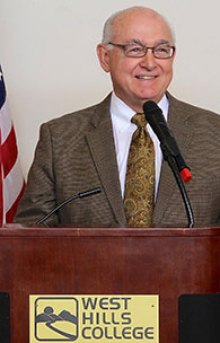West Hills College Chancellor Frank Gornick upbeat about future of local campuses

Gornick told the interested audience that the district begins the new academic year in great financial shape and is focused heavily on growth, technology and student success.
Some of the highlights for the upcoming year include the expansion of technology, new instructors at both campuses and construction which recently began on the $13 million Student Union Center at the Lemoore campus.
He also said a nationwide search to replace retiring Lemoore President Don Warkentin is down to its final stages as the District named three finalists for the challenging position – to run a college growing by leaps and bounds.
Gornick also lamented that over the next 10 years, high school graduation rates will remain flat or will decline slightly. He added that there will be a renewed focus on adult learners. The fall semester he said will greet 5,600 students.
Gornick talked about the changing landscape of education and the importance of technology to colleges, and said a profound change is sweeping campuses, the country and the world. “We decided at some point in history to get horses off the roads and replace them with automobiles,” he said. “We are at a similar point in history right now, with regard to technology.”
Following his address, Dr. Gornick introduced guest speaker Mark Milliron, co-founder and Chief Learning Officer of Civitas Learning, a Texas-based organization bringing emerging technology, data science and design together with educational institutions.
The speaker said digital resources, data science and analytics in education are all important to adopt and provide new and better ways in which technology can benefit and assist educators. But colleges have to be careful not to get ahead of students who are older and who will be returning to campuses in the future to update their tech skills.
Milliron pointed out there are some 38 million people in America who have “some college” but haven’t earned a degree or credential, and many are or will be coming back to school to learn how to use technology in the workplace. This poses a challenge for traditional college courses and curricula. “They’re going to need mini-semesters, five-week courses, and other new learning models” in order to succeed, he said. “The current model of 16 to 18 week semesters allows too many opportunities for older students to get off track.” Many of these students have jobs, kids, families and other responsibilities, he said, “and it’s easy to get distracted for a couple of weeks. If you can’t get to class for two weeks, it’s almost impossible to catch up. That’s the reason they dropped out in the first place. Life happens.”
West Hill’s Deputy Chancellor Ken Stoppenbrink reviewed the $42.7 million district budget for 2015-16 and said the district is in good fiscal shape and is positioned well going into the new fiscal year.
“This includes a reserve of 8% or $ 3.1 million,” he said. “Additionally, we received an additional $1 million in student success/student equity funding. The revenue is based on 5,281 FTES (full-time equivalent students) which is an increase of 3.5% from the previous fiscal year.”
West Hills College
- West Hills District officials extend remote learning in face of evolving COVID-19 crisis
- West Hills College District Board approves COVID-19 Emergency Plan Resolution
- Update: Change of plans for state community college basketball championships as officials cancel state tournament Updated 5 years ago
- West Hills Coalinga Spring Rodeo falls victim to coronavirus
- West Hills District's eighth 'Essential Elements' series registration opens for April 16
- West Hills Lemoore paramedic program partners with Tachi Palace in mass casualty incident drill
_0.jpg)

.jpg)



